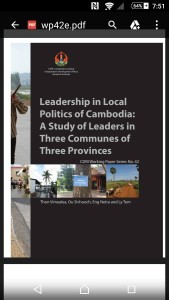Leadership in Local Politics of Cambodia: A Study of Leaders in Three Communes of Three Provinces
By Thon Vimealea, Ou Sivhuoch, Eng Netra and Ly Tem
CDRI–Cambodia’s Leading Independent Development Policy Research Institute CDRI Working Paper Series No. 42
 What is leadership? How does it constitute and shape local politics? How is leadership understood and practised in the local context? Do changes in the institutions of local government affect the way leadership is perceived, understood and practised? Do they bring demands for different ways and styles of leadership and perhaps different leaders? How is leadership gendered and is this changing? This chapter aims to provide a relevant framework within which to discuss the empirical data relating to these questions. It begins by discussing important concepts that shape leadership—power, authority, and legitimacy – as explained and defined in international literature, including classic social science. From a look at these concepts, we would be able to identify who has power, what kinds of power they have and who exactly has power to influence the agenda; how those in power exercise their authority, whether they have the necessary legitimacy to do so, and what kinds of legitimacy they have and need.
What is leadership? How does it constitute and shape local politics? How is leadership understood and practised in the local context? Do changes in the institutions of local government affect the way leadership is perceived, understood and practised? Do they bring demands for different ways and styles of leadership and perhaps different leaders? How is leadership gendered and is this changing? This chapter aims to provide a relevant framework within which to discuss the empirical data relating to these questions. It begins by discussing important concepts that shape leadership—power, authority, and legitimacy – as explained and defined in international literature, including classic social science. From a look at these concepts, we would be able to identify who has power, what kinds of power they have and who exactly has power to influence the agenda; how those in power exercise their authority, whether they have the necessary legitimacy to do so, and what kinds of legitimacy they have and need.
Since cultural context has a far-reaching effect on the functioning of power and authority, and therefore also leadership, the chapter then discusses particular cultural forms in south-east Asia. In particular, we discuss how patron-client networks influence political leadership in Southeast Asia and shape how leadership and governance are practised and perceived in these countries; and how such practice and understanding of political leadership have changed or transformed amidst political and economic transformations as a result of globalisation and a trend towards more democratic rule. In reviewing local leadership in Cambodia, different domains of power and their relevance to Cambodia’s current political context, especially under decentralisation, are discussed before looking at general and specific literature on gender in leadership.
